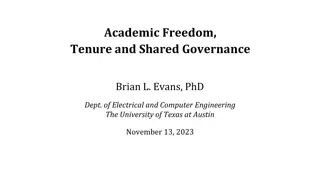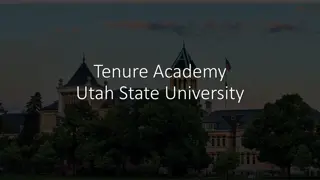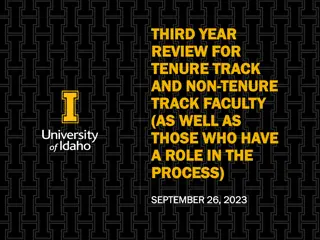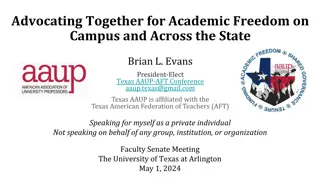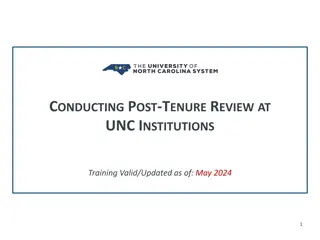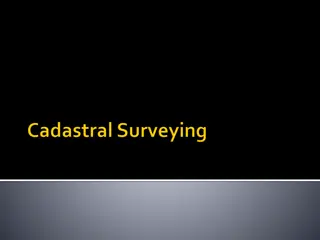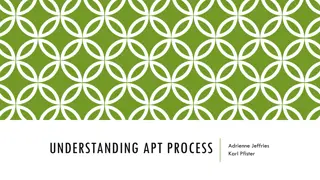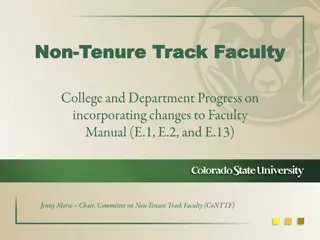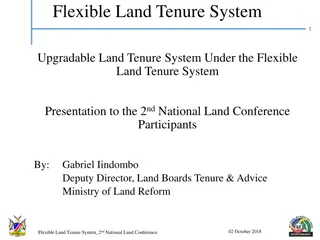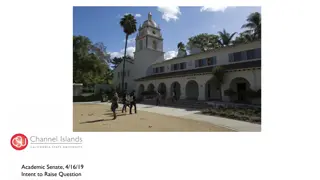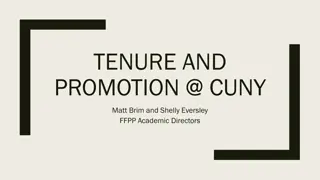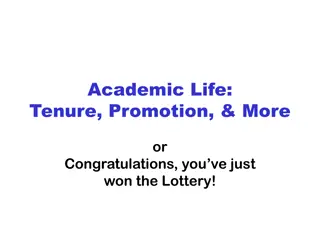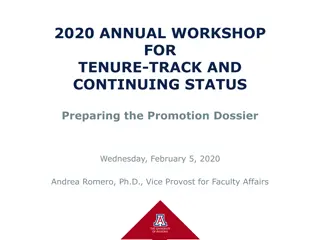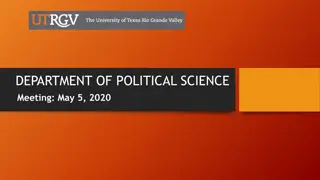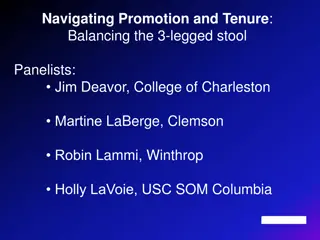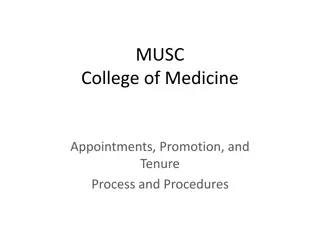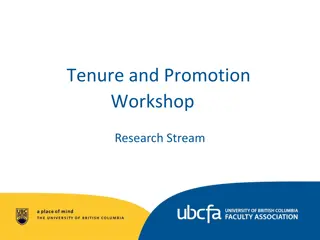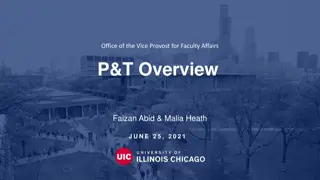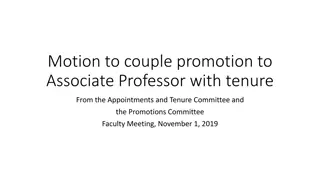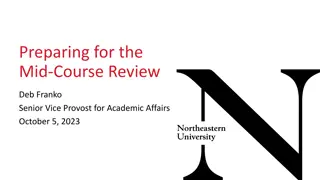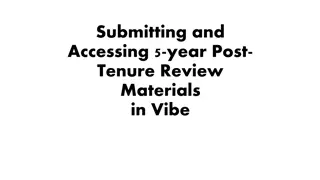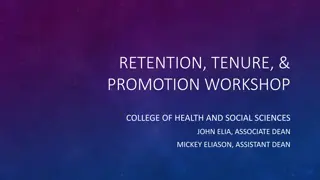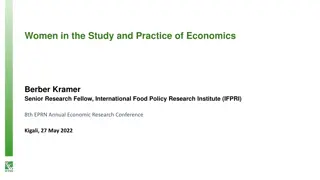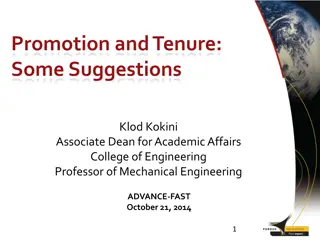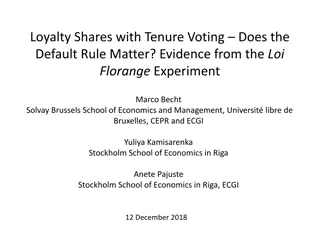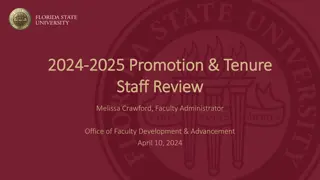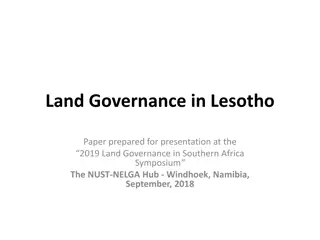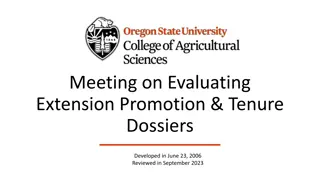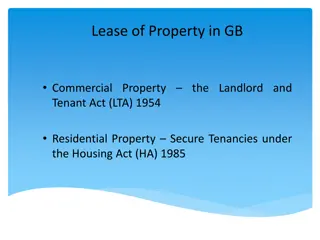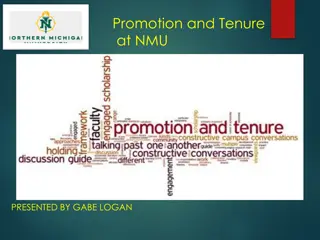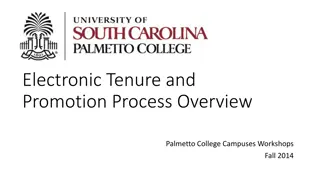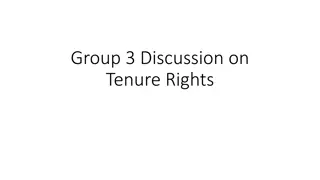Promotion and Tenure Seminar 2023
Learn about academic tracks, promotion criteria, and expectations for successful promotion & tenure. Explore diverse pathways!
0 views • 29 slides
Advocating Together for Academic Freedom - Importance and Principles
Advocating for academic freedom is crucial for the advancement of knowledge and quality education. The American Association of University Professors (AAUP) champions academic freedom, shared governance, and economic security for faculty members. The 1940 Joint AAUP/AAC&U Statement of Principles on A
4 views • 14 slides
Higher Education Advocacy in Texas: Importance of Academic Freedom, Tenure, and Research
Advocacy for academic freedom, tenure, and other higher education values in Texas is crucial for advancing educational standards. Highlighting the significance of shared governance and expressing the benefits of teaching and research in different disciplines can help in advocating for these values.
1 views • 24 slides
Promotion, Tenure Process Overview and Recent Updates
Explore the detailed process timeline for promotion and tenure, along with recent updates to policies impacting faculty reviews. Gain insights into dossier preparation, key stages, and goals of the revisions. Understand the significance of external peer review and COVID impact statements in the eval
1 views • 30 slides
Faculty Roles in Developing Policies for DEI and Tenure Laws
Texas legislation passed SB 17 and SB 18 impacting faculty tenure. The bills restrict hiring of tenured faculty after 2024, emphasizing academic freedom and post-tenure review. Faculty involvement in policy development is crucial to address potential consequences. The evolving tenure laws aim to sha
2 views • 16 slides
Importance of Academic Freedom, Tenure, and Shared Governance in Higher Education
Academic freedom, tenure, and shared governance are crucial in higher education for fostering open inquiry, protecting faculty rights, and ensuring institutional integrity. Organizations like the American Association of University Professors (AAUP) advocate for these principles to uphold faculty aut
5 views • 9 slides
New Texas Tenure Law
The Texas tenure law SB 18, with versions passed by the Senate and House, has sparked concerns regarding academic freedom, faculty dismissal procedures, and potential impacts on faculty recruitment and institutional quality. The Senate version restricts tenure opportunities, while the House version
1 views • 9 slides
Tenure Academy Utah State University
Tenure at Utah State University is a significant milestone achieved after a probationary period, recognizing outstanding faculty performance. This process involves annual meetings, faculty code adherence, and insights from Provost Smith. The university supports faculty members in pursuing tenure and
4 views • 25 slides
Third-Year Review for Tenure-Track and Non-Tenure-Track Faculty
Third-Year Review is a formal evaluation process for full-time, untenured faculty members aimed at assessing progress towards promotion or tenure. This review provides a comprehensive report of the faculty member's accomplishments and contributions within 24 to 36 months of employment. It offers fee
0 views • 20 slides
Advocating Together for Academic Freedom - Texas AAUP Conference 2024
Advocating for academic freedom at universities, the Texas AAUP conference will address the importance of shared governance, economic security, and quality education. The conference aims to empower faculty to innovate in research and teaching, fostering critical thinking and diversity of viewpoints.
2 views • 17 slides
UNC Post-Tenure Review Training Overview
This training provides essential guidance for the Post-Tenure Review (PTR) process at UNC Institutions, aimed at assessing faculty in teaching, research, and service roles. Covering PTR purpose, scope, cycle, and outcomes, it emphasizes excellence, performance expectations, rewards, and sanctions fo
1 views • 17 slides
Understanding Cadastral Systems in Land Management
Cadastral systems play a crucial role in land management by handling land registration, property taxation, and land tenure. These systems involve private conveyancing, registration of deeds, cadastral surveying, and mapping to maintain records efficiently. They provide information on parcel index ma
1 views • 16 slides
Streamlining the Tenure Review Process Fall 2019
The tenure review process is being revamped for efficiency, transitioning from traditional binders to USB drives and digital folders. Reports, timelines, and expectations are being streamlined, providing a clear structure for submission. Quick reference guides are available for easy access to essent
0 views • 9 slides
Understanding the APT Process in Academic Institutions
This informative content delves into the intricate procedures of the Appointment, Promotion, and Tenure (APT) process in academic settings. It covers key aspects such as the composition of the APT Committee, the role of the Arts and Sciences Advisory Committee (ASAC), typical tenure-track career pro
7 views • 16 slides
Understanding Faculty Appointments and Advancement in Higher Education
Explore the variety of faculty appointments, including tenure-track and non-tenure-track roles, and learn about the advancement opportunities such as promotion criteria in higher education institutions. Delve into the revisions and updates related to faculty appointments and ranks.
0 views • 13 slides
Enhancing Land Security and Ownership Through Flexible Land Tenure System
The Flexible Land Tenure System (FLTS) provides affordable security of tenure to informal settlement settlers, aiming to empower low-income individuals economically. It offers alternative titles that can be upgraded to Freehold Titles, ensuring perpetual security of title and various benefits such a
0 views • 13 slides
Questions on Service Credit Determination and Title IX Policies
The Academic Senate raises questions regarding the process for determining service credit for new tenure-track hires and concerns about documenting complaints of inappropriate behavior in relation to Title IX policies. The responses provide insights into the criteria for service credit evaluation an
0 views • 18 slides
Guidelines for Tenure and Promotion Process at CUNY
Comprehensive guidelines for the tenure and promotion process at CUNY, including expectations for scholarly publications, external reviews, dossier components, and strategic planning. Learn about the key stages, involvement of academic directors, external reviewers, and decision-making entities to n
0 views • 15 slides
Academic Promotion and Tenure Guidelines in Higher Education
Understanding the academic promotion and tenure process is crucial for faculty members in higher education. This guide covers eligibility criteria, timelines, reasons for extending tenure, expectations for promotion, research track considerations, and the definition of tenure. It highlights the impo
0 views • 21 slides
Understanding Academic Tenure and Promotion: A Comprehensive Guide
Explore the intricacies of academic tenure, promotion, and the significance of tenure-track positions in this informative content. Delve into the tenure decision process, evaluation criteria, faculty roles, and the importance of academic productivity. Gain insights into why tenure matters, the tenur
0 views • 20 slides
Workshop on Preparing Promotion Dossier for Tenure-Track Faculty
Annual workshop led by Andrea Romero, Vice Provost for Faculty Affairs, at the University of Arizona discussing the promotion review process for tenure-track and continuing status faculty. The workshop covers topics like evaluation of teaching, promotion dossier preparation, and tenure-clock delay r
0 views • 52 slides
Faculty Evaluation Guidelines and Annual Department Meeting Updates
This document outlines the faculty evaluation guidelines including post-tenure review, annual review, and promotion/tenure criteria. It also provides updates on upcoming department meetings scheduled for September to December 2020.
0 views • 22 slides
Navigating Promotion and Tenure in Academia
Explore insights from panelists representing different universities on navigating the promotion and tenure process in academia. Understand the significance of tenure, criteria for advancement, tips for success, and maintaining work-life balance. Contact information for panelists provided for further
0 views • 7 slides
MUSC College of Medicine Promotion and Tenure Process
The MUSC College of Medicine outlines the detailed process and criteria for appointments, promotions, and tenure. It involves submission of packets to committees, reviews by subcommittees and full committees, and final recommendations for approval or disapproval. Specific criteria are provided for f
0 views • 28 slides
Understanding Tenure and Promotion Processes in Academia
Explore the tenure and promotion workshop for faculty members, covering topics like criteria, tenure clock, professorial streams, procedures, and periodic reviews. Gain insights into the tenure and promotion processes to support successful career advancement in academia.
0 views • 52 slides
Office of the Vice Provost for Faculty Affairs Overview
The Office of the Vice Provost for Faculty Affairs provides an overview of the tenure and non-tenure systems, faculty ranks, promotion and tenure processes, and guidelines at the University of Illinois. It emphasizes the importance of tenure in ensuring academic freedom and economic security for fac
0 views • 19 slides
Proposal for Promotion and Tenure Guidelines in Academic Setting
Proposal includes data on recent hires, successful promotion applications, and tenure standards at the institution and comparable universities. It presents a calendar for tenure-track faculty outlining years of experience and service, sabbatical options, and pre-tenure research leaves.
0 views • 8 slides
Understanding the Mid-Course Review for Tenure-Track Faculty
The Mid-Course Review is a pivotal assessment for tenure-track faculty, evaluating their progress in teaching, scholarship, and service midway through the tenure process. Conducted by unit tenure committees, it provides recommendations for reappointment or non-reappointment, serving as a crucial ste
0 views • 22 slides
Submitting and Accessing 5-Year Post-Tenure Review Materials in Vibe
The post-tenure review process in Vibe is essential for career development funding and compliance with NJ statutes and agreements. Users need to follow specific guidelines when submitting and accessing materials through Vibe, including retaining copies of all documents due to Vibe's limitations in s
0 views • 30 slides
Faculty Retention, Tenure, and Promotion Workshop Guidelines
Explore essential insights on faculty retention, tenure, and promotion processes discussed in the workshop by the College of Health and Social Sciences. Learn about dossier preparation, levels of review, CV guidelines, and key considerations to enhance your candidacy for RTP.
0 views • 24 slides
Gender Disparities in Economics: Challenges and Solutions
Gender disparities persist in the field of economics, impacting women's representation, tenure, salaries, and job satisfaction. Factors driving these gaps include differences in productivity, family responsibilities, biased evaluations, and research choices. The leak of women in the tenure process f
0 views • 7 slides
Guidelines for Promotion and Tenure Process in Academia
Suggestions for navigating the promotion and tenure process in academia, including understanding the levels of review, documenting scholarly achievements, seeking feedback and mentoring, and managing career progression from assistant professor to full professor. Resources and policies to support suc
0 views • 9 slides
Loyalty Shares with Tenure Voting: Insights from the Loi Florange Experiment
Loyalty shares with tenure voting (LSTV) enhance voting rights based on holding periods, potentially impacting control mechanisms in various countries. The study examines the default rule's influence on the adoption and impact of LSTV, focusing on its availability, transparency, and implications for
0 views • 38 slides
Faculty Promotion and Tenure Process Overview
In this detailed guide, learn about generating, organizing, and preparing eBinders for the faculty promotion and tenure process. Find out who can generate eBinders, how candidates and delegates upload materials, and the steps involved in creating and submitting eBinders. Discover the responsibilitie
0 views • 16 slides
Land Governance in Lesotho: An Overview
This paper discusses the institutional frameworks, legal frameworks on land tenure, and land registration processes in Lesotho. It covers the roles of central and local government institutions, as well as informal actors like customary chiefs. The legal framework on land tenure, including statutory
0 views • 22 slides
Meeting on Evaluating Extension Promotion & Tenure Dossiers
Discussion held in June 2006, reviewed in September 2023, focused on aiding faculty with extension appointments in preparing promotion and tenure dossiers. Objectives included helping faculty and committees understand impact assessment and evaluating dossiers effectively. Panel members from differen
0 views • 19 slides
Overview of Lease and Tenancy Laws in Great Britain
Understand the lease and tenancy laws in Great Britain, including the Landlord and Tenant Act 1954 for commercial properties and the Housing Act 1985 for secure tenancies. Learn about the operation of break clauses, security of tenure for tenants, and how landlords can end leases with security of te
0 views • 10 slides
Guidelines for Promotion and Tenure at Northern Michigan University
Understand the requirements and processes for promotion and tenure at Northern Michigan University. The guidelines cover tenure requirements, prior service credit, judgmental criteria, eligibility for promotion, and documentation needed for evaluation. Meeting the criteria specified in the bylaws an
0 views • 18 slides
Electronic Tenure and Promotion Process Overview at Palmetto College Campuses
Learn about the electronic tenure and promotion process at Palmetto College Campuses, including workshops, support team details, purpose of the workshop, development and implementation timeline, rationale for the electronic system, and the unchanged process details as outlined in the Faculty Manual.
0 views • 40 slides
Challenges and Solutions for Tenure Rights in Fisheries Value Chain
Various countries like Sri Lanka, Pakistan, and India are facing challenges with tenure rights to land and resources along the fisheries value chain, impacting both men and women. Issues include displacement for development projects, lack of recognition of customary rights, and encroachment on natur
0 views • 11 slides





